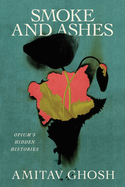
In this sweeping history, renowned novelist Amitav Ghosh (Gun Island; Flood of Fire; River of Smoke) brilliantly traces the impacts of the opium trade on India, China, and his own family. Smoke and Ashes is a deep dive into the history of colonialism and poppy production on the Indian subcontinent that is sure to interest those horrified by the opioid crisis, or intrigued by what historian Hans Derks termed the enduring "narco-character" of wars in Vietnam and Afghanistan.
By forcing Indians to grow opium at steeply subsidized rates and penalizing them if they failed to meet targets, the British soon had vast quantities of a very cheap, addictive substance on their hands, which they introduced to Chinese society, much as Purdue Pharma pushed OxyContin in the modern United States. As addiction claimed large swaths of Chinese society, the British watched the money roll in, uncaring about the effects of their criminal policies. Many British people--and Americans, including Franklin Delano Roosevelt's grandfather--became unbelievably wealthy in the opium trade, caring little about the cost to Indian and Chinese culture.
Those with long memories are sure to see the parallels between colonial policies during the opium years and China's currently pugnacious attitude toward the West. Unfortunately, as Smoke and Ashes makes clear, many have forgotten this, because "European empires have been astonishingly successful at whitewashing the historical record." However, a deeper understanding of the painful impact of colonialism is vital in order to foster any kind of contemporary reconciliation between China, India, and the West. --Jessica Howard, freelance book reviewer

